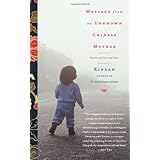
Average Reviews:

(More customer reviews)This book recounts the personal stories of Chinese women who have lost their daughters. As a Chinese radio journalist, the author interviewed women from all over China to gather material for the radio program she hosted. The author found that many women shared stories of heartache, remorse, and guilt over the baby daughters they never saw grow to adulthood.
The book can be emotional as it chronicles some tough topics, including gendercide and gender inequality in China. For parents who are facing questions from children they adopted from China, this book is something you should read to learn more about country, the status of women in China, and other issues. One of the many points the author attempts to show is that just as your child has questions about his/her biological mother, the Chinese women who gave up children wonder where their children are and whether they have found mothers who love them. The author does a good job outlining the inner anguish felt by mothers who were separated from their daughters; these sentiments might be beneficial to share with adopted children who ask questions like, "Why did mommy give me away?"
All of the stories are unsettling. A former midwife tells of her pricing structure and the cost to deliver a highly prized boy over a girl and the preparation of a pot of water that could, depending on the baby's gender, be used to cleanse or dispatch a newborn. There is the account of the woman who cannot view a birthday party because of her past deeds. There is the story of the couple that had ten years to provide a male heir but all their pregnancies produced girls, leaving them to decide what to do with their daughters. These are only a few of the stories within the book.
The author discusses why Chinese families frequently prefer boys over girls. These reasons can include laws that prohibit females from inheriting property, traditions that require a son to care for aging parents, preferences for males who can work the land, and policies limiting the number of children a family can have. The author also highlights the treatment of mothers who bear daughters. Women, according to the author, are frequently subjected to years of verbal, emotional, and/or physical abuse and left without any standing within the community. Many are so consumed with guilt over the daughters that were killed or abandoned that they attempt suicide. The author outlines the various ways that a baby girl can be eliminated when unwanted by a family. If not selectively aborted, she may be drowned or smothered within moments of birth. Baby girls who do not meet these fates, may be abandoned, perhaps in the countryside, to fend for themselves.
In addition to the stories of women who were separated from their infants, the book includes sections on letters from mothers who adopted Chinese children, Chinese adoption laws, and the incidence of suicide among the Chinese.
Overall, the book is well-written. There were instances when additional footnotes or editing would have been beneficial. On more than one occasion, a reference is made to a topic that is not to be discussed or explained for several pages. One such occurrence was in the beginning of the book when a reference is made to MBL. The reader finds out several pages later than MBL stands for Mothers' Bridge of Love which is a charity established by the author to help Chinese women who have lost children, Chinese children who have been adopted and may lack and understanding of their cultural background, and children living in destitute conditions in China. In addition, sometimes the author's own commentary is drawn out. The author frequently takes several pages to express her surprise or anger over a story. While I recognize that the author is the medium for transmitting the stories to readers, I frequently just wanted to read the stories in the book and process them without the author's shock. I felt her expanded commentary sometimes detracted from the anguish and sadness of the women profiled and the book's overall themes.
There were times when I was reading this book that I just wanted to say, "Stop. Let this end" Eventually, as books do, the stories ended but my mind kept going and processing. This is not the type of book you forget about and is worth a spot on your "to read" list.
Click Here to see more reviews about: Message from an Unknown Chinese Mother: Stories of Loss and Love

0 comments:
Post a Comment